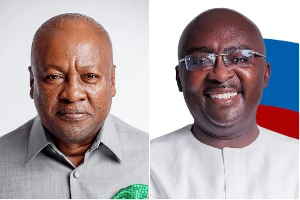 Dr. Mahamudu Bawumia and John Dramani Mahama
Dr. Mahamudu Bawumia and John Dramani Mahama
As Ghana's election season intensifies, the recent 'meet the press' events with Dr. Mahamudu Bawumia and John Mahama played out like a predictable script—journalists asking if candidates could promise specific changes, and the candidates replying with resolute affirmations.
Yet, these interactions missed probing deeper, non-economic challenges crucial to Ghana's progress. The lack of focus on foundational issues such as poor maintenance culture or the erosion of national pride, corruption and civic responsibility means that without addressing these root causes, the lofty promises are likely to falter.
This pattern of superficial engagement and unmet promises is reflective of a broader cultural malaise across various sectors in Ghana, including the national football team, the Black Stars. The contrast between the players' performances in international clubs versus national matches points to a pervasive lack of professionalism, a symptom of broader societal issues.
This widespread apathy towards excellence affects not only sports but also public services, business operations, and general societal progress, stemming from a collective resignation fuelled by repeated disappointments.
Historically, both major political parties have demonstrated a concerning tendency to prioritize personal and party gain over national welfare. Campaigns seem more focused on outmaneuvering political adversaries than on genuinely engaging with the issues that affect the daily lives of Ghanaians.
This has led to governance that feels more about retaining power than about serving the public, with leaders appearing as custodians of authority rather than as genuine public servants.
In the bustling campaign atmosphere, we are bombarded with promises of GDP growth and infrastructure development. Yet, these economic indicators only skim the surface of what truly affects the common Ghanaian. The deeper societal issues—such as why initiatives fail due to poor maintenance cultures or how diminished national pride undermines collective efforts—are rarely tackled.
The repeated cycles of hopeful promises followed by disillusionment have deeply impacted the Ghanaian psyche, leading to a decline in trust in public institutions and leadership. It’s a tragic sight: a nation so full of potential is continuously stymied by leaders who seem unable to genuinely prioritize the long-term well-being of their people over their ambitions.
The harsh reality is that if leaders and political parties continue on this trajectory, focusing on superficial achievements and short-term gains, Ghana’s future looks grim. We risk stagnation, with apparent economic growth masking unresolved, deeper societal issues like inequality, educational gaps, and healthcare inefficiencies.
There’s a real danger here—not just of failing to progress, but of regressing. Increasing disenchantment with the political process could lead to widespread civic disengagement, lower voter turnout, and even less accountability in governance. This apathy can create a fertile ground for corruption and inefficiency to thrive, further entrenching the challenges that hold our nation back.
As we approach the elections, it's crucial that they serve as more than just a contest of promises. They should be a platform for profound national introspection and a clarion call for genuine change. The electorate must challenge Dr. Bawumia, Mr. Mahama, and their parties to demonstrate a real commitment to tackling Ghana's ingrained issues. We must ask the hard questions: How will they address the underlying cultural and societal dynamics that are critical to the success of any policy?
To break this cycle, it's crucial that leaders go beyond mere rhetoric and address the underlying attitudes and values that contribute to these issues. This requires a fundamental shift in how we approach governance and leadership.
Leaders need to demonstrate through actions that professionalism and commitment to quality are valued and rewarded. This shift must also be supported by a robust educational system that not only instils technical skills but also fosters a sense of duty, pride, and ownership over one's work and the country's future.
The future of Ghana hinges significantly on our leaders' ability to look beyond economic metrics and engage with the fundamental questions of identity, purpose, and collective well-being. This election presents an opportunity for Ghanaians to demand more than rhetoric—to seek leaders who understand and are prepared to tackle the complex web of challenges that face our nation. The need for leadership that genuinely serves the people has never been more urgent.
In the midst of all these promises and political maneuvering, one must pause and ask the Ghanaian people: do we truly understand our own needs? Have we been distracted by the superficial allure of economic gains while our more profound needs, like those for identity, community, and a functioning public ethos, continue to be neglected?
This election is not just about choosing leaders who can foster economic growth; it's about selecting those who will engage with the very essence of what it means to be Ghanaian, restoring not only our economy but our national pride and civic integrity.